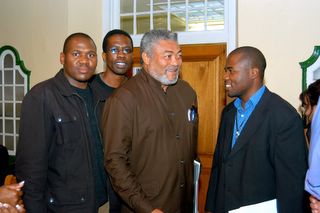Bate Felix
Those who know him describe him as an intellectual with a social conscience; Professor Thandwa Zizwa Mthembu describes himself as “a simple man”. A mathematician by training, Mthembu does not hesitate to use unorthodox methods to find solutions. His childhood friend, Rhodes University professor of mathematics Sizwe Mabizela recalls Mthembu’s reaction to a Biblical story about 10 maidens waiting for grooms. Five clever maidens had brought oil for their lamps; the other five did not and therefore were not married. Mthembu, then a high school pupil, was critical that the five clever maidens had not reminded their peers to bring oil too.
In 2002, at the age of 39, Mthembu became the youngest deputy vice-chancellor of Wits, in charge of partnership and development. He applies the same attitude he had to the Bible story when it comes to the issues he deals with in his functions at the helm of the university.
“I think I am a simple person. Sometimes people find me pedantic, but I believe I am straightforward and logical. It comes, I think, because of my background as a mathematician,” says Mthembu.
Born in Hlazakazi (near Isandlwana Mount) in KwaZulu-Natal, on 12 January 1963, Mthembu grew up in Ethalaneni in Nkandla where he attended primary school under the tutelage of his father, who was headmaster. “I learnt the art of leadership, hard work and responsibility at a very early age as my father got us involved in all his work,” he remembers.
After matric, Mthembu obtained a scholarship to study mining engineering at Pietersburg Technikon, but he left after six months when he realised the programme was not challenging enough. But it was not a complete waste of time: “One thing he did learn there was ballroom dancing, including rumba and cha cha,” says Mabizela.
Mthembu taught at a secondary school for six months before registering for a BSc at Fort Hare in 1981. Graduating with an Honours in Mathematics in 1985, he obtained a scholarship to pursue his Masters at Vanderbilt University in America.
On his return, he registered for a PhD in Mathematics at Wits, which he obtained in 1991. Mthembu went back to the US to continue his postdoctoral studies at Ohio State University. He was thinking of making a career there when events in South Africa made him change his mind.
From the US, Mthembu observed the transformation process in the country, especially in the higher education sector. “There were so many things that were not in keeping with the new ethos. I think that’s what started to make me raise so many questions among my colleagues. Watching how issues were managed, I began to think that I wouldn’t do worse,” he recalls.
“Instead of sitting on the sidelines and complaining, I opted to return and contribute to the transformation process. I wanted to put to test some of my ideas because I believe unless you are in a position to do something; you will never get the opportunity to prove yourself right or wrong.”
Since his return in 1994, Mthembu has applied his intellect and leadership qualities in the various positions he has held: senior lecturer, associate professor, head of department, campus principal and deputy vice-chancellor – at the universities of the North, Vista and Durban-Westville, and currently at Wits University.
Abandoning his academic gown for tailored suits and elegant print shirts, Mthembu hasn’t lost any of the amiable qualities that his PhD supervisor Prof. Doron Lubinsky and colleague Prof. Kathy Driver, head of the Maths department, noted in him. “I recall his friendliness, his principled beliefs,” says Lubinsky, who attended a conference with Mthembu in Italy, after which the two went sightseeing together.
Driver, who completed her PhD at the same time as Mthembu, recalls how Lubinsky used to expect them to come up with new theorems each week. “It is true to admit that there were some weeks during the three years when I would knock on Thandwa’s door (or he on mine) and say: “Me? None. Zip. Zero. Brain blocked. So, how many great new theorems do YOU have to share with Doron this week?” recalls Driver.
“Passers-by who stopped to share the joke that was assumed to be the cause of so much laughter always hurried away, completely reassured that all mathematicians are mad.”
Wits nearly lost the services of Mthembu as he applied for the vice-chancellorship positions at the University of the North West and Durban Institute of Technology. “I wanted to leave because I thought at one point Wits didn’t need my skills anymore. But I was later convinced that I still had a lot to offer.”

